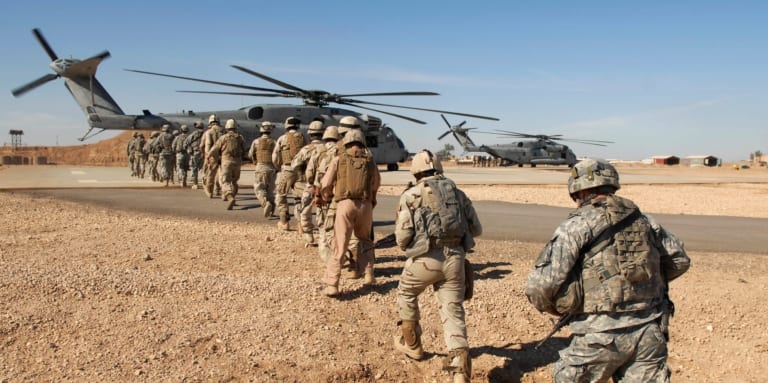
A vote in the Iraqi parliament on Sunday brought the United States a step closer to defeat in the battle for influence that it has waged with Iran since the 2003 American invasion of Iraq. The 328-member parliament voted 170-0 to demand that the government work to end the presence of all foreign troops in the country and prohibit them from using its land, water, and air space for any reason. Although the resolution is nonbinding, caretaker Prime Minister Adel Abdul-Mahdi has already stated that he will comply. The vote shows that even though almost half the members of parliament—including most Kurds and Sunnis—did not attend or vote, nobody dared oppose the resolution openly.
The vote marks the beginning of the end of the US intervention in Iraq, which was based on the assumption that overwhelming US military dominance would lead to a quick victory over Saddam Hussein’s army and that the superiority of its political system would transform Iraq into a democracy. The US military indeed made short shrift of Saddam’s armed forces; however, it proved useless in the asymmetrical warfare that ensued as Iraqis mobilized militias the United States could not defeat. Al-Qaeda in Iraq, the Islamic State (IS), and now the mostly Shia and Iran-influenced Popular Mobilization Units (PMUs) reappear and multiply no matter what the United States does. As for US political influence, it proved no match to that of Iran.
It is not the first time the United States experiences the limitations of its military might. In Vietnam, it was ultimately defeated by those it despised as little men in black pajamas but whose commitment and persistence in a struggle that to them was existential made up for what they lacked in sophisticated weapons. The scenario is being repeated in Afghanistan, where the 19-year conflict between the United States and the Taliban is inexorably moving toward a settlement that will practically leave the Taliban in charge of the country. And now, after the killing of al-Quds Force Commander Qassem Soleimani, the United States is facing a real possibility that its days in Iraq are numbered—unless it wants to remain as an occupation force battling simultaneously the PMU, a regrouping IS, and an Iran seeking revenge for Soleimani’s killing. President Donald Trump can taunt Iran, tweeting ignorantly and arrogantly that the country has never won a war. In reality, Tehran is in the process of defeating the United States in Iraq.
The fundamental flaw of US policy toward Iraq and Iran is the same one that led to defeat in Vietnam. The United States has formidable weapons but it does not have the will to sustain the conflict indefinitely, throwing in the resources and making the sacrifices that would make victory possible. The conflict is not an existential one for Washington and it can opt out. But Iran, like the Taliban and Vietcong, is engaged in such a conflict and quitting is not an option, any more than it was an option for the United States to withdraw back into isolationism in the middle of World War II. Making things worse, Soleimani’s killing on Iraqi soil, in a military operation that violated the terms of the US presence in Iraq, makes continued American policy an existential threat to Iran.
At the root of the US predicament in Iraq and in the region is the chronic absence of a policy based on a realistic assessment of the situation. The United States went to war in Iraq in 2003 with post-Cold War illusions about the triumph of democracy and its prowess at nation-building, and without understanding the nature of the relationship between Iraq and Iran. Yes, the two fought a war in the 1980s and Iraq under Saddam Hussein remained a counterbalance to Iran’s regional ambitions. But the latter is also deeply embedded in Iraqi politics through the Shia parties and militias it had helped set up in the 1980s as well as through the clerical establishment that intersected in the seminaries in Iran’s Qom and Iraq’s Najaf, with deep rivalries but equally profound ties. The complexities of Iraq-Iran relations could not be factored into a policy, even if they had been understood; but from the beginning of the invasion the United States, the outsider, deluded itself that it could outcompete Iran, the insider. This was not to be.
Soleimani’s assassination has pushed the battle for influence between Washington and Tehran toward its denouement. His death will most probably not significantly weaken the impact of the al-Quds Force. Ayatollah Khamenei immediately appointed his deputy, Brigadier General Esmail Ghaani, to replace him, stating that the al-Quds Force’s mandate remained the same. Granted, Soleimani was, by all accounts, a man of exceptional influence, but the al-Quds Force is an institution, not a one-man operation. Iran will retaliate in some fashion that is unlikely to diminish US military might, but it may nevertheless cause many deaths and much destruction.
Iraq’s reaction, on the other hand, directly undermines the United States’ position in the region. The United States may not be forced to withdraw all troops from Iraq immediately, but it has already announced that it will suspend anti-IS operations and training of the Iraqi military while it braces for the Iranian response to Soleimani’s killing. To be sure, the United States still has military superiority in Iraq, as pictures of heavily armed Marines guarding the US embassy in Baghdad and new troops preparing to ship out demonstrate. In theory, it could decide to stay on in Iraq as an occupation force.
For a president seeking to reduce US presence in the region, Donald Trump is facing the unhappy choice between totally surrendering Iraq to Iranian influence or fighting a war he does not want in an election year. Either way, Iran has outwitted the United States. The real price the United States will pay, however, will be inflicted by Iraq.

